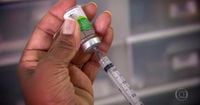The Ministry of Health in Brazil held a national Day D of Vaccination against the flu on Saturday, May 10, 2025, aiming to protect the population before the winter season, a time known for increased respiratory virus circulation. This significant mobilization took place simultaneously across the Northeast, Central-West, South, and Southeast regions, with the federal government collaborating with state and municipal authorities.
The ambitious goal of the campaign is to vaccinate 90% of the target audience, which exceeds 81.6 million people, including children, the elderly, and pregnant women. Health Minister Alexandre Padilha participated in the event in Brasília, where he vaccinated individuals from priority groups and emphasized the campaign's importance. "The vaccine will be available throughout the year at Basic Health Units. However, the significance of this Day D is to draw public attention and mobilize the entire health structure of our country. It is crucial to get vaccinated before the winter becomes harsher," Padilha stated.
The vaccination campaign, which commenced on April 7, 2025, has already distributed over 51.3 million doses of the flu vaccine to states and the Federal District. The expectation is to vaccinate more than 32 million elderly individuals, 15 million children, and 1.6 million pregnant women, as well as millions of individuals with comorbidities, health professionals, teachers, indigenous populations, and those experiencing homelessness.
In the state of São Paulo, a special vaccination event was organized at the Nossa Senhora do Brasil Basic Health Unit in the central region of the city. Ana Estela Haddad, the Secretary of Information and Digital Health, highlighted the need for vaccination among priority groups, including individuals over 60, pregnant women, postpartum women, children aged 0 to 6 years, indigenous people, and those living on the streets. "Vaccination is life. It prevents diseases," she asserted.
As part of the campaign, the state of São Paulo received 11.6 million doses of the flu vaccine and aims to immunize up to 19.3 million people. The vaccine includes strains of the influenza virus A/Victoria (H1N1), A/Croatia (H3N2), and B/Austria (Victoria lineage), which are prevalent in the Southern Hemisphere this year. According to the Ministry of Health, the flu vaccine can prevent 60% to 70% of severe cases and deaths.
In Rio de Janeiro, vaccination was available at 717 locations, including all 240 vaccination rooms in primary care units, Super Carioca vaccination centers, and various community spaces. Approximately 500,000 doses were allocated for this Day D, with the city already having vaccinated over 700,000 individuals against influenza. The goal is to reach the entire target audience of 3 million by the end of the campaign.
Meanwhile, in the state of Rio Grande do Sul, around 400 municipalities participated in the Day D of vaccination, targeting a population exceeding 5.3 million. Due to rain forecasts, vaccination actions in Canoas and Porto Alegre were rescheduled for May 17 and May 24, respectively. In Gravataí, all 30 health units were open until 2 PM to immunize priority groups.
In Alvorada, health units remained open until 5 PM, while Novo Hamburgo offered vaccinations at its Casa de Vacinas and other health units until the same hour. Cachoeirinha, São Leopoldo, and Sapucaia do Sul also opened multiple locations for vaccination, with the latter having 12 sites available until 5 PM.
In the Federal District, more than 100 Basic Health Units mobilized for the Day D of vaccination. Juracy Cavalcante, the Secretary of Health in the DF, noted that vaccination is not just an individual act but a collective commitment to life. "We must strengthen vaccination campaigns because vaccines save lives, prevent diseases, and reduce hospitalizations," he emphasized.
The vaccination against influenza is free and available at Basic Health Units across the country. It is recommended for over 20 priority groups, focusing particularly on children aged 6 months to under 6 years, pregnant women, postpartum women, and elderly individuals aged 60 and above.
In addition to the flu vaccine, other immunizations such as those for hepatitis and COVID-19 were also offered during the Day D activities. The COVID-19 vaccine has been integrated into the National Vaccination Calendar, ensuring that children under 5, pregnant women, and the elderly receive the most current vaccine available against circulating strains.
As Brazil grapples with an increase in respiratory diseases, the Ministry of Health announced a R$ 100 million annual incentive to enhance care for children with Severe Acute Respiratory Syndrome (SRAG). This year alone, there have been 45,228 reported cases of SRAG, with 42.9% testing positive for respiratory viruses, including the respiratory syncytial virus (VSR) and influenza.
With the winter months approaching, the urgency for vaccination has never been clearer. The influenza virus currently stands as the leading cause of respiratory infection-related deaths in Brazil. Health officials are urging the public to take advantage of the available vaccinations to protect themselves and their communities.


